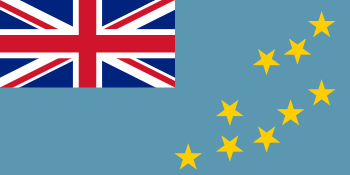Religion in Tuvalu
| Part of a series on the |
| Culture of Tuvalu |
|---|
 |
| History |
| Languages |
| Cuisine |
| Religion |
| Art |
|
Music and performing arts |
| Sport |
|
Symbols |
|
The Church of Tuvalu, (Te Ekalesia Kelisiano Tuvalu) is the state church of Tuvalu, although in practice this merely entitles it to "the privilege of performing special services on major national events".[1] Theologically the Church of Tuvalu is part of the Reformed tradition.
Its adherents comprise about 97% of the 10,837 (2012 census) inhabitants of Tuvalu.[2][3] All Islands of Tuvalu have traditional chiefs (alikis) who are members of the Church of Tuvalu.[4] Most followers of other religions or denominations are found in Funafuti, the capital, with the exception of the relatively large proportion of followers of the Bahá'í Faith on Nanumea Island.[4]
Religious affiliation as a percentage of the population
The population of Tuvalu was 10,837 as of the 2012 census.[Note 1] The largest faith groups are:[4][6]
- Christianity 97%
- Bahá'í 3%
The Tuvalu Brethren Church, a new charismatic Protestant group, is said to have as many as five hundred adherents (4.6% of the population), but this could not be confirmed by independent sources.[6]
The Roman Catholic community is served by the Mission Sui Iuris of Funafuti. In Tuvalu there are also smaller numbers of Muslims, Baptists, members of The Church of Jesus Christ of Latter-day Saints (LDS Church) and atheists.[4] The Ahmadiyya Muslim Community has approximately 50 members in the country, representing 0.5% of the population.[7]
Constitutional right to freedom of belief, expression and association
The Constitution of Tuvalu provides for freedom of religion, including the freedom to practice, the freedom to change religion, the right not to receive religious instruction at school or to attend religious ceremonies at school, and the right not to "take an oath or make an affirmation that is contrary to his religion or belief"[8] and the Government generally respects this right in practice.[4] Societal abuses or discrimination based on religious belief or practice occur, but are relatively infrequent.[4]
Discrimination, including acts and threats of violence, occurred against Brethren Church members on Nanumanga, prompting some group members to move to Funafuti.[6] Subsequent legal action resulted in the determination of the Court of Appeal of Tuvalu that the constitutional rights of the members were breached.[9]
In a second legal action four people from Nanumaga sued in the High Court of Tuvalu claiming unlawful dismissal from their employment on grounds that included unlawful discrimination on the basis of religion and that their constitutional right to freedom of belief, expression and association had been denied. Three claims were dismissed, with a fourth plaintiff being awarded general damages and aggravated damages.[10]
Proselytizing by non-traditional and minority religious groups
The Jehovah’s Witnesses, the Brethren Church, and other religious groups remain free to proselytizing or holding meetings, although there are reports of discrimination against followers of non-traditional and minority religious groups who are viewed by some Tuvaluans as disrupting traditional societal structures.[3] For example, on Funafuti, a formal ban on proselytizing by the Jehovah’s Witnesses that the falekaupule issued in 2012 remained in effect.[3]
Notes
References
- ↑ "2010 Report on International Religious Freedom - Tuvalu". United States Department of State. 17 November 2010. Retrieved 22 December 2015.
- ↑ "Te Ekalesia Kelisiano Tuvalu". Reformiert Online/Reformed Online. 2015. Retrieved 22 December 2015.
- 1 2 3 "International Religious Freedom Report for 2014: Tuvalu". United States Department of State - Bureau of Democracy, Human Rights and Labor. 2014. Retrieved 22 December 2015.
- 1 2 3 4 5 6 "International Religious Freedom Report 2007: Tuvalu". United States Department of State - Bureau of Democracy, Human Rights and Labor. 14 September 2007. Retrieved 22 December 2015.
- ↑ "Tuvalu: Millennium Development Goal Acceleration Framework - Improving Quality of Education" (PDF). Ministry of Education and Sports, and Ministry of Finance and Economic Development from the Government of Tuvalu; and the United Nations System in the Pacific Islands. April 2013. Retrieved 13 October 2013.
- 1 2 3 "International Religious Freedom Report 2012: Tuvalu". United States Department of State. 20 May 2013. Retrieved 22 December 2015.
- ↑ Gary D. Bouma; Rodney Ling; Douglas Pratt (2010). Religious Diversity in Southeast Asia and the Pacific. p. 198.
- ↑ Constitution of Tuvalu, article 23.
- ↑ "Teonea v Pule o Kaupule of Nanumaga [2009] TVCA 2; Court of Appeal Civil Appeal No. 1 of 2005 (4 November 2009)". PACLII. Retrieved 10 March 2014.
- ↑ "Konelio and Others v Kaupule of Nanumaga [2010] TVHC 9; Case 13 of 2008 (23 March 2010)". PACLII. Retrieved 10 March 2014.